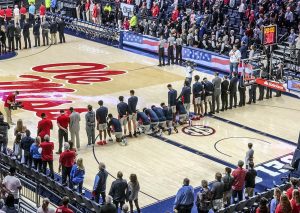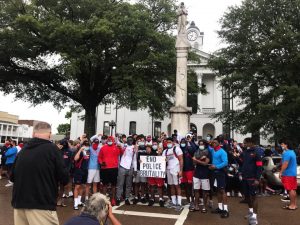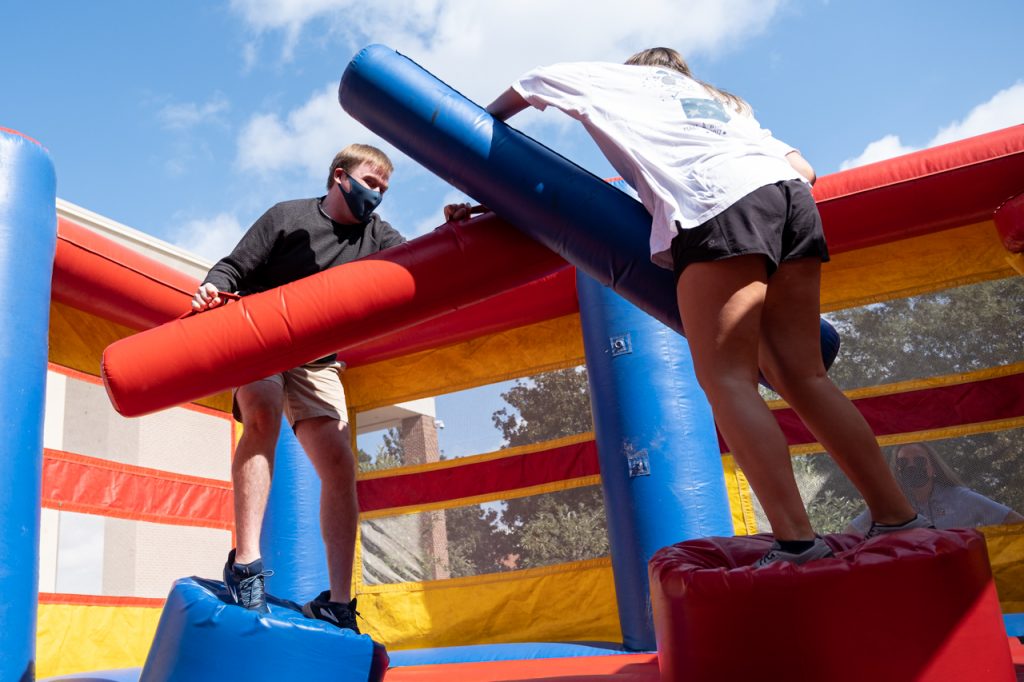The University of Mississippi continues to experience its long-fought battle between heritage and progress. Thus, one of the leading money-makers for the state — college sports — has spent decades collecting its voice to demand social change in the state of a “de-dixied” Mississippi.
The story started in 1982 with the first-ever Black male cheerleader John Hawkins, who refused to wave the Confederate flag at Ole Miss football games. This blip in university history was the first step toward a social change that would not happen until June 28, 2020, when the Mississippi state flag — which included the stripes and stars of the Confederate emblem — officially ceased to fly in the state.
In 1982, Confederate flags waved like pom-poms at every sporting event, and at the time, the Ole Miss team carried a Confederate flag about the size of the football stand itself.
“While I’m an Ole Miss cheerleader, I’m still a Black man,” Hawkins said in a press conference in 1982. “In my household, I wasn’t told to hate the flag, but I did have history classes and know what my ancestors went through and what the Rebel flag represents. It is my choice that I prefer not to wave one.”
The stand from Hawkins paved the way for the current state of college sports: protests strung together by student-athletes, demonstrations before games and pushes for legislative change from coaches.
The next push for change came from former Ole Miss football player Deuce McAllister and several other student-athletes who pushed administrators to eliminate the waving of Confederate flags at football games in 1997. Then-Chancellor Robert Khayat officially banned sticks inside Vaught-Hemingway, ultimately banning the flags.
Since then, the university has attracted national media attention many times — from neo-Confederate rallies to fraternity members posing with guns in front of the Emmett Till memorial. The rallies held by over 100 neo-Confederate supporters on campus led the Ole Miss basketball team to take their own stand, becoming the first male college student-athletes to kneel during the national anthem on Feb. 24, 2019.

“The majority of it was just that we saw one of our teammates doing it and didn’t want him to be alone,” former Ole Miss basketball player Breein Tyree said in a press conference after the game. “We’re just tired of these hate groups coming to our school and portraying our campus like we have these hate groups in our actual school.”
The nod to the NFL demonstrations against police brutality and racism sparked the conversation about the differentiation between “heritage” and “hate” once again in a state that seems to be encapsulated by Confederate iconography.
The year 2020 has brought on a year of change. After the country erupted in reaction to George Floyd’s death, the demand for change was seemingly much greater.
Ole Miss athletes and coaches took a stand during a private Unity Walk with UM defensive end Ryder Anderson leading the way on June 6. The walk started at the Ole Miss Track and Field Complex with athletics director Keith Carter, women’s basketball coach Yolette McPhee-McCuin and Anderson speaking to the athletes who attended.
“We’re here because racism is here,” Anderson said when they reached the field. “We’re here because police brutality is here — because systematic oppression is here. All across America, including Mississippi (and) including right here in Oxford. So, my challenge to you is to fight.”
The issue of Confederate symbols landed on the Lafayette County Courthouse steps once again as student-athletes pushed for further change regarding the Confederate monument located on the Square, shortly after the Institutions of Higher Learning (IHL) approved the relocation of the on-campus monument in June.
After a viral Twitter video of UM football players pushing the city of Oxford to relocate the monument on the Square, the team gathered together and created the LOUnited march with Anderson and linebacker MoMo Sanogo leading the rally at the end of June.
At the same time as the LOUnited march, over 50 athletics coaches lobbied at the state’s capitol building pushing for the removal of the state flag.
With the help of college sports, the state flag was officially removed after flying for 126 years.
The protests didn’t stop there as members of the UM football team skipped practice to march on the Square on Aug. 28 after the shooting of Jacob Blake in Kenosha, Wisconsin. The team chanted the words, “No Justice, No Peace,” while holding signs that said “End Police Brutality.”

From rallies and protests to change and history-making, UM student-athletes have exhibited their power of influence since 1982 and have since demonstrated protests such as the Ole Miss football team and Florida kneeling before the first game of the season and Ole Miss soccer holding red cards that said, “Show Racism the Red Card.”















